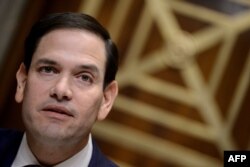The research is clear: The more women participate in peace processes, the more likely peace is possible.
According to the Council on Foreign Relations, any agreement reached at a peace negotiation in which women participate is 35% more likely to last at least 15 years.
If the agreement includes the participation of civil society, including women's groups, CFR says, the accord is 64% less likely to fail.
The White House seems to recognize these findings when it says that its strategy, unveiled this month, "aims to ensure women are no longer absent from, or overlooked at, the negotiating table."
The administration's newly unveiled strategy, lauded by Republicans and Democrats in Congress, builds on efforts by the Obama administration.
Republican Sen. Marco Rubio of Florida says women and girls are the most vulnerable when conflicts erupt, and they are often targeted with violence, specifically sexual violence.
"They are left out of discussions to find political solutions in peace processes," said Rubio. "They are barred from making decisions about their own future."
Democratic Sen. Jeanne Shaheen of New Hampshire welcomed the White House initiative, adding that the main challenge now is ensuring that the strategy is implemented in a way that is effective and recognizes the role that women play around the world.
Melanne Verveer, director of the Georgetown Institute for Women, Peace and Security, says the world will be watching to see how purposefully and effectively the U.S. implements this strategy.
"We can have the best plan for peace and security or the best plan to take care of other issues, but livelihoods are absolutely critical," said Verveer, a former ambassador-at-large for women's issues during the Obama administration.
"The correlation between decreases in violence against women and increases in their ability to participate economically also go together," she told VOA, emphasizing critical links between security and well-being.
Both lawmakers and advocates say funding is key to implementing the strategy.
In 2018, an initiative by Shaheen saw $4 million allocated to hire gender advisers at the Department of Defense.
But responding to a VOA question, a senior administration official said that "rather than use new funding, we're actually reframing funding that's already in existence."
" 'Reframing' is often seized as an answer when there are little new or adequate resources," Verveer told VOA.






